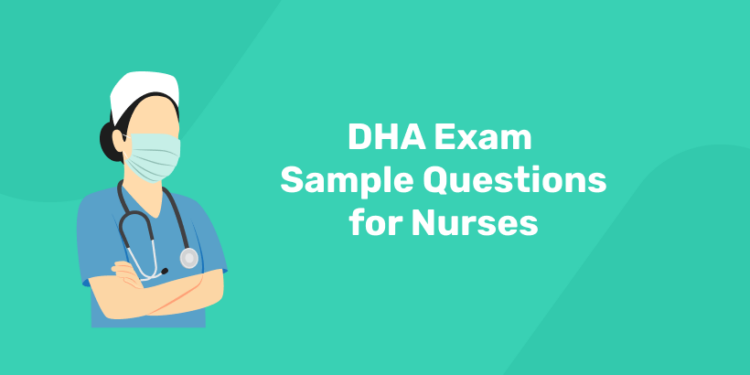Table of Contents
DHA Exam Sample Questions are crucial for nurses aiming to secure a license to practice in Dubai. Preparing with these questions enhances familiarity with the exam format and highlights key areas of knowledge necessary for success.
To practice in Dubai’s healthcare sector as a nurse you need to pass the DHA exam. This exam tests the competency of healthcare professionals to ensure they meet the high standards required to deliver quality care in the UAE. As part of the preparation you need to get familiar with the type of questions you will be asked in the exam. The DHA exam covers patient care, medical procedures, nursing ethics and practical knowledge relevant to your daily nursing practice.
Knowing the format and content of the exam will boost your confidence and performance. Sample questions play a big role in this process, it’s a benchmark to gauge your readiness and identify areas that need more study. These questions test not only theoretical knowledge but also practical application which is crucial in the dynamic world of healthcare.
DHA Exam Questions for Nurses
1. A patient with chronic obstructive pulmonary disease (COPD) is admitted to the hospital. Which of the following interventions is most appropriate for this patient?
- A. Administering high-flow oxygen
- B. Encouraging deep breathing exercises
- C. Restricting fluid intake
- D. Providing a high-protein diet
Answer: B. Encouraging deep breathing exercises
2.Which of the following is the primary goal of palliative care?
- A. Cure the disease
- B. Provide comfort and improve the quality of life
- C. Prolong life at all costs
- D. Conduct experimental treatments
Answer: B. Provide comfort and improve the quality of life
3. A nurse is caring for a patient with diabetes mellitus. Which of the following is a priority nursing intervention?
- A. Administering insulin as prescribed
- B. Restricting fluid intake
- C. Encouraging bed rest
- D. Providing a high-fat diet
Answer: A. Administering insulin as prescribed
4. A 45-year-old patient is experiencing chest pain. What is the first action the nurse should take?
- A. Administering pain medication
- B. Assessing the patient’s vital signs
- C. Performing a detailed medical history
- D. Preparing the patient for a chest X-ray
Answer: B. Assessing the patient’s vital signs
5. A patient with a history of hypertension is admitted to the hospital. Which of the following medications is commonly prescribed to manage hypertension?
- A. Metformin
- B. Lisinopril
- C. Insulin
- D. Omeprazole
Answer: B. Lisinopril
Get Certified! Get Confident! Join Our DHA Course
6. During a blood transfusion, a patient develops chills and fever. What should the nurse do first?
- A. Stop the transfusion
- B. Increase the infusion rate
- C. Administer antipyretics
- D. Notify the physician
Answer: A. Stop the transfusion
7. A nurse is teaching a patient with asthma about the use of a metered-dose inhaler (MDI). Which instruction should be included in the teaching?
- A. “Hold your breath for 10 seconds after inhaling the medication.”
- B. “Exhale immediately after inhaling the medication.”
- C. “Use the inhaler only when you have symptoms.”
- D. “Shake the inhaler before each use.”
Answer: A. “Hold your breath for 10 seconds after inhaling the medication.”
8. A patient is receiving intravenous (IV) fluid therapy. Which sign indicates that the patient may be experiencing fluid overload?
- A. Dry mucous membranes
- B. Jugular vein distention
- C. Decreased urine output
- D. Hypotension
Answer: B. Jugular vein distention
9. A nurse is assessing a patient with a suspected urinary tract infection (UTI). Which symptom is most indicative of a UTI?
- A. Chest pain
- B. Shortness of breath
- C. Dysuria
- D. Blurred vision
Answer: C. Dysuria
10. A patient with heart failure is on a low-sodium diet. Which of the following foods should the nurse recommend the patient avoid?
- A. Fresh fruits
- B. Processed cheese
- C. Whole grains
- D. Lean meats
Answer: B. Processed cheese
11. A nurse is preparing a patient for surgery. Which of the following actions should the nurse take first?
- A. Administering preoperative medications
- B. Ensuring informed consent is signed
- C. Performing a physical assessment
- D. Teaching postoperative exercises
Answer: B. Ensuring informed consent is signed
12. A patient with a recent stroke is experiencing difficulty swallowing. What is the best action for the nurse to take?
- A. Offering thin liquids
- B. Providing a pureed diet
- C. Encouraging the patient to eat quickly
- D. Administering a high-fiber diet
Answer: B. Providing a pureed diet
13. A nurse is caring for a patient with acute renal failure. Which of the following laboratory values should the nurse monitor closely?
- A. Hemoglobin
- B. Blood urea nitrogen (BUN)
- C. Platelet count
- D. Serum glucose
Answer: B. Blood urea nitrogen (BUN)
14. A patient with a leg fracture is placed in a cast. What is the most important instruction the nurse should give to the patient?
- A. “Keep the cast clean and dry.”
- B. “Exercise the affected limb regularly.”
- C. “Elevate the limb to reduce swelling.”
- D. “Report any unusual sensations or pain.”
Answer: D. “Report any unusual sensations or pain.”
15. A nurse is caring for a patient with chronic pain. Which of the following is an important aspect of managing chronic pain?
- A. Administering pain medication only when pain is severe
- B. Using a multidisciplinary approach
- C. Encouraging the patient to avoid all physical activity
- D. Limiting the patient’s use of pain medication
Answer: B. Using a multidisciplinary approach
16. A patient with a wound infection is prescribed antibiotics. What is the most important nursing action when administering antibiotics?
- A. Administering the medication with food
- B. Monitoring the patient for signs of an allergic reaction
- C. Ensuring the patient drinks plenty of fluids
- D. Applying warm compresses to the wound site
Answer: B. Monitoring the patient for signs of an allergic reaction
17. A nurse is providing discharge teaching to a patient with hypertension. Which of the following lifestyle changes should the nurse recommend?
- A. Reducing salt intake
- B. Increasing caffeine consumption
- C. Avoiding physical activity
- D. Consuming more processed foods
Answer: A. Reducing salt intake
18. A patient with a urinary catheter develops a fever and chills. What is the most likely cause?
- A. Dehydration
- B. Urinary tract infection
- C. Allergic reaction
- D. Fluid overload
Answer: B. Urinary tract infection
19. A nurse is caring for a patient who has just undergone surgery. Which of the following is a priority assessment in the immediate postoperative period?
- A. Checking the patient’s blood glucose level
- B. Assessing the patient’s respiratory status
- C. Monitoring the patient’s bowel sounds
- D. Evaluating the patient’s skin turgor
Answer: B. Assessing the patient’s respiratory status
20. A nurse is educating a patient about the management of chronic obstructive pulmonary disease (COPD). Which of the following instructions should the nurse include?
- A. “Avoid smoking and exposure to lung irritants.”
- B. “Increase your intake of dairy products.”
- C. “Limit your physical activity to prevent fatigue.”
- D. “Use your rescue inhaler only when you feel short of breath.”
Answer: A. “Avoid smoking and exposure to lung irritants.”
Get Certified! Get Confident! Join Our DHA Course
DHA Registered Nurse Sample Questions
1: What does DHA primarily regulate in Dubai?
1. What is the normal range for adult blood pressure?
- a) 90/60 mmHg
- b) 120/80 mmHg
- c) 140/90 mmHg
- d) 160/100 mmHg
Answer: b) 120/80 mmHg
2. What is the primary purpose of the nursing process?
- a) To administer medication
- b) To provide a systematic method for delivering patient care
- c) To diagnose diseases
- d) To manage hospital resources
Answer: b) To provide a systematic method for delivering patient care
3. Which medication is commonly used to treat bacterial infections?
- a) Antivirals
- b) Analgesics
- c) Antibiotics
- d) Antifungals
Answer: c) Antibiotics
4. How often should a nurse check vital signs for a stable postoperative patient?
- a) Every 15 minutes
- b) Every 30 minutes
- c) Every hour
- d) Every 4-6 hours
Answer: d) Every 4-6 hours
5. What is the most effective way to prevent the spread of infection in a healthcare setting?
- a) Wearing gloves
- b) Hand hygiene
- c) Using hand sanitizers
- d) Wearing masks
Answer: b) Hand hygiene
6. What should a nurse do first when a patient reports chest pain?
- a) Administer pain medication
- b) Call for help
- c) Assess the patient’s vital signs and oxygen saturation
- d) Provide reassurance
Answer: c) Assess the patient’s vital signs and oxygen saturation
7. What is an important consideration when administering medication to an elderly patient?
- a) Assess for potential drug interactions and adjust dosages accordingly
- b) Increase the dosage due to slower metabolism
- c) Avoid giving medication at night
- d) Administer medications with food
Answer: a) Assess for potential drug interactions and adjust dosages accordingly
8. How should a nurse position a patient experiencing dyspnea?
- a) Supine position b) Prone position
- c) In a semi-Fowler’s or high-Fowler’s position
- d) Trendelenburg position
Answer: c) In a semi-Fowler’s or high-Fowler’s position
9. What is the normal range for adult respiratory rate?
- a) 8-12 breaths per minute
- b) 12-20 breaths per minute
- c) 20-24 breaths per minute
- d) 24-30 breaths per minute
Answer: b) 12-20 breaths per minute
10. Which blood test is used to monitor long-term glucose control in diabetic patients?
- a) Fasting blood sugar
- b) Random blood sugar
- c) HbA1c test
- d) Oral glucose tolerance test
Answer: c) HbA1c test
11. What is the primary role of insulin in the body?
- a) To digest carbohydrates
- b) To regulate blood glucose levels
- c) To aid in protein synthesis
- d) To maintain fluid balance
Answer: b) To regulate blood glucose levels
12. Which type of isolation is required for a patient with tuberculosis?
- a) Contact isolation
- b) Droplet isolation
- c) Airborne isolation
- d) Protective isolation
Answer: c) Airborne isolation
13. How should a nurse assess a patient’s pain level?
- a) By observing facial expressions
- b) Using a pain scale, such as 0-10 or the Wong-Baker FACES scale
- c) By asking the patient to describe their pain
- d) By measuring vital signs
Answer: b) Using a pain scale, such as 0-10 or the Wong-Baker FACES scale
14. What is a key sign of dehydration in a patient?
- a) Hypertension
- b) Dry mucous membranes and decreased urine output
- c) Bradycardia
- d) Hyperthermia
Answer: b) Dry mucous membranes and decreased urine output
15. Which intervention is most important for a patient with a fever?
- a) Administering antipyretics
- b) Encouraging fluid intake to prevent dehydration
- c) Providing a cold compress
- d) Monitoring heart rate
Answer: b) Encouraging fluid intake to prevent dehydration
16. How should a nurse handle a needle-stick injury?
- a) Ignore it if it doesn’t hurt
- b) Report the incident immediately and follow post-exposure protocols
- c) Wait to see if symptoms develop
- d) Treat the wound with alcohol
Answer: b) Report the incident immediately and follow post-exposure protocols
17. What is the normal range for adult heart rate?
- a) 40-60 beats per minute
- b) 60-100 beats per minute
- c) 100-120 beats per minute
- d) 120-140 beats per minute
Answer: b) 60-100 beats per minute
18. What is the main symptom of a urinary tract infection?
- a) Fever
- b) Dysuria (painful urination)
- c) Cough
- d) Diarrhea
Answer: b) Dysuria (painful urination)
19. Which nursing intervention is important for a patient with hypertension?
- a) Administering antihypertensive medications
- b) Educate the patient about low-sodium diets and lifestyle changes
- c) Encouraging a high-sodium diet
- d) Restricting fluid intake
Answer: b) Educate the patient about low-sodium diets and lifestyle changes
20. What is a common side effect of opioid analgesics?
- a) Diarrhea
- b) Constipation
- c) Hyperactivity
- d) Weight loss
Answer: b) Constipation
Get Certified! Get Confident! Join Our DHA Course
Entri’s DHA Course
For those preparing for the DHA exam, utilizing comprehensive resources like Entri’s DHA course is invaluable. This course provides detailed study materials, practice exams, and expert guidance to ensure candidates are well-prepared and confident on exam day, helping to advance their nursing careers in Dubai. Enroll now to enhance your preparation and increase your chances of success. Entri’s course includes:
- Expert Instruction: Learn from experienced healthcare professionals who provide in-depth knowledge and insights.
- Practice Tests: Access a wide range of practice questions and mock exams to prepare you for the actual DHA exam.
- Flexible Learning: Study at your own pace with online modules that fit your schedule.
- Supportive Community: Join a community of learners and professionals for support, networking, and guidance.
Conclusion
Preparing for DHA exam is a big step for nurses who want to move up the career ladder in Dubai’s fast paced healthcare industry. The sample questions in this blog will give you an idea of the type of questions that may be in the exam and covers all the important topics for nursing practice. By studying and practicing with these questions, nurses can increase their knowledge, boost their confidence and pass the DHA exam.
For those who want to take their preparation to the next level, enrolling in comprehensive courses like Entri’s DHA course can be a big help. Entri’s course has extensive study materials, expert guidance and practice exams that mimics the actual exam format so candidates are well prepared. This targeted preparation is not only for passing the exam but also to equip nurses with the skills and knowledge to excel in their role in Dubai’s healthcare system.
More to Explore |
|
|---|---|
| Study Tips For DHA Licensing Exams | |
Frequently Asked Questions
What is the DHA exam for nurses?
The DHA exam is a mandatory licensing exam for nurses who wish to practice in Dubai. It assesses the knowledge and skills required for safe and effective nursing care.
How many questions are on the DHA exam?
The DHA exam typically consists of 100 multiple-choice questions that must be completed within 2 hours.
What topics are covered in the DHA exam for nurses?
The exam covers various topics, including general nursing, medical-surgical nursing, pediatrics, maternity and women’s health, and mental health nursing.
How can I prepare for the DHA exam?
Preparation can include studying relevant textbooks, attending review courses, and practicing with sample questions like those provided in this blog.
What is the passing score for the DHA exam?
The passing score for the DHA exam varies, but it generally requires a minimum of 60-65%.
How often can I retake the DHA exam if I fail?
Candidates can retake the DHA exam up to three times within one year. After three failed attempts, candidates must undergo additional training before retaking the exam.
What are the eligibility requirements for the DHA exam?
Eligibility requirements include having a recognized nursing degree and relevant clinical experience. Specific details can be found on the DHA’s official website.
How long is the DHA license valid?
The DHA license is typically valid for one year and must be renewed annually.
How do I register for the DHA exam?
Registration can be completed online through the DHA’s official website. Candidates must create an account, submit the required documents, and pay the exam fee.
How can Entri's DHA course help me pass the exam?
Entri’s DHA course provides targeted preparation through in-depth study materials, expert insights, and practice exams that mimic the actual exam format, enhancing your readiness and confidence.











